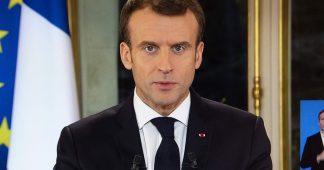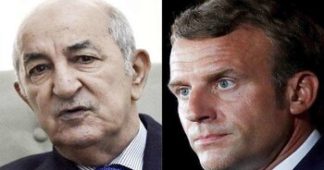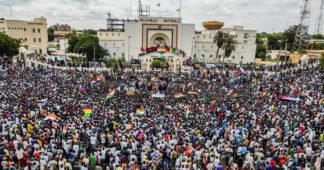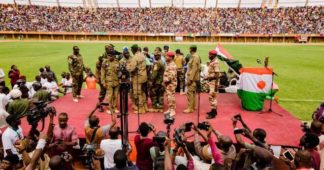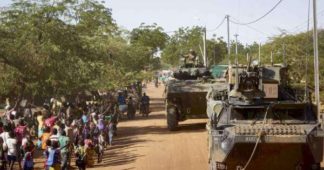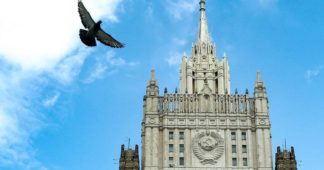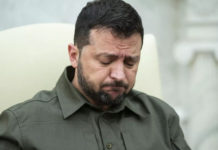France refuses to withdraw its ambassador and troops from Niger, and reiterates its threat of supporting military invasion by ECOWAS, while the regional bloc itself is “determined to bend backwards to accommodate diplomatic efforts”
by Pavan Kulkarni
Aug 29, 2023
Niger’s military government reportedly cut off electricity and water supply to the French embassy in capital Niamey on Sunday, August 27, after the expiry of the 48-hours it gave the French ambassador, Sylvain Itte, to leave the country.
It has also instructed suppliers to stop providing the water, electricity and food supplies to the French military base, warning that anyone continuing to supply the base with goods and services will be treated as “enemies of the sovereign people.”
The 1,500 troops-strong military base in Niamey has become a site of frequent demonstrations, with people demanding that Niger’s former colonizer withdraw its troops. Thousands gathered outside this base on Sunday, demanding that its ambassador and troops leave the country, waving the national flag of Niger, reportedly alongside those of the BRICS countries and the DPRK.
A similar protest was also held on Friday, August 25, hours after the military government, the National Council for the Safeguarding of the Country (CNSP), ordered the French ambassador out of Niger. Protesters raised anti-French slogans, and threatened to invade the base if the troops did not leave Niger in a week.
Earlier this month, the CNSP ended Niger’s military agreements with France and ordered its troops to leave by September 2. With France refusing to withdraw on the grounds that it does not recognize the authority of the military government, protests are expected to intensify as this deadline approaches.
‘Niger doesn’t belong to France’
“Niger doesn’t belong to France. We told the French to leave, but they said ‘no’,” complained Aicha, a supporter of CNSP protesting outside the base. “As citizens we don’t want the French here. They can do whatever they want in France, but not here,” she told Al Jazeera.
The popular sentiment against the presence of French troops has manifested in several mass demonstrations, especially militant over the last two years. By cracking down on the anti-French movement and inviting into the country more French troops, ordered out of neighboring Mali by its military government, former Nigerien president Mohamed Bazoum had consolidated domestic perception of him being a puppet of France.
His removal from office on July 26 in a military coup led by the then head of the presidential guard, Gen. Abdourahmane Tchiani, has won popular support, with thousands repeatedly taking to streets to rally behind the CNSP, reiterating the demand for the withdrawal of French troops.
‘The fight will not stop until the day there are no longer any French soldiers in Niger’
“The fight will not stop until the day there are no longer any French soldiers in Niger,” CNSP member Colonel Obro Amadou said in his address to a crowd of around 20,000 supporters who had gathered in Niger’s largest stadium in Niamey on Saturday, August 26. “It’s you who are going to drive them out,” he added.
Insisting that “France must respect” the choice of Nigerien people, Ramatou Boubacar, a CNSP supporter in the stadium, complained about the continued control France maintained over successive Nigerien governments even after the end of colonial rule. “For sixty years, we have never been independent [until].. the day of the coup d’etat,” she told the AFP.
French President Emmanuel Macron has however remained obstinate. “[W]e do not recognize the putschists, we support a president [Bazoum] who has not resigned”, he said in his remarks on Monday, August 28, reiterating French support for a military invasion of Niger by the Economic Community of West African States (ECOWAS), “when it decides”.
Expressing its “full support” to France and reiterating that the European Union (EU) “does not recognize” the CNSP, its spokesperson for foreign affairs, Nabila Massrali, also raised the specter of war. “The decision of the putschists to expel the French ambassador,” she said, “is a new provocation which cannot in any way help to find a diplomatic solution to the current crisis.”
‘ECOWAS is determined to bend backwards to accommodate diplomatic efforts’
However, the current chair of ECOWAS, Nigeria’s president Bola Tinubu, said on Saturday, August 26: “We are deep in our attempts to peacefully settle the issue in Niger by leveraging on our diplomatic tools. I continue to hold ECOWAS back, despite its readiness for all options, in order to exhaust all other remedial mechanisms.”
Tinubu has toned down his initially aggressive and threatening rhetoric against Niger after facing anti-war protests and opposition domestically. On August 5, a day before the one-week deadline given by ECOWAS on July 30 to the CNSP to reinstate Bazoum was to expire, the senate of Nigeria refused to support military action.
Without the participation of Nigeria — which has Africa’s largest economy, amounting to about 67% of ECOWAS’ GDP, and the largest military in the sub-region — the bloc’s capability of undertaking a military action is drastically reduced.
This is especially the case because Mali, Burkina Faso and Guinea — which are among the 15 countries in ECOWAS, but suspended and sanctioned after similar popularly-supported coups backed by the domestic anti-French movement — have extended support to Niger.
Mali and Burkina Faso, whose military governments have successfully ordered the French troops out of the country, have committed to mobilize their military in defense of Niger. Together, these four countries amount to nearly 60% of ECOWAS’ land area.
Nevertheless, the ECOWAS heads of state met again in Nigeria on August 10 and ordered their Chiefs of Defense Staffs “to immediately activate” the bloc’s stand-by force. The Chiefs of Defense Staffs of ECOWAS member states subsequently held a two-day meeting on August 17 and 18 in Ghana.
Ghana’s president is also facing domestic opposition and may be unlikely to be able to secure approval of the parliament where the main opposition party, opposed to military intervention, has the same number of seats as the ruling party.
Nevertheless, “We are ready to go any time the order is given,” Abdel-Fatau Musah, the ECOWAS Commissioner for Political Affairs, Peace and Security, declared at the conclusion of this meeting, adding that an unspecified “D-day is also decided. We’ve already agreed and fine-tuned what will be required for the intervention.”
He introduced a caveat, however, that, “As we speak, we are still readying [a] mediation mission into the country, so we have not shut any door.”
A week later, on Friday, July 26, the ECOWAS said it was still “determined to bend backwards to accommodate diplomatic efforts.” ECOWAS commission president Omar Touray, former Secretary of State for Foreign Affairs of Gambia told the media: “For the avoidance of doubt, let me state unequivocally that ECOWAS has neither declared war on the people of Niger, nor is there a plan, as is being rumored, to invade the country.”
Invading Niger will not be the walk in the park, warns CNSP President, Gen. Tchiani
Nevertheless, stating that “threats of aggression on the national territory are increasingly being felt,” Brigadier General Moussa Barmou placed the Nigerien military on “Maximum alert” on August 25, “in order to avoid a general surprise”.
Abdoulaye Diop and Olivia Rouamba, Foreign Ministers of Mali and Burkina Faso, visited Niamey on Thursday, August 24, reiterating their “rejection of an armed intervention against the people of Niger which will be considered as a declaration of war” on their own countries.
They also welcomed the two orders signed by the CNSP president Abdourahamane Tchiani that day, “authorizing the Defense and Security Forces of Burkina Faso and Mali to intervene on Nigerien territory in the event of an attack.”
“If an attack were to be undertaken against us,” Tchiani said in his televised address on Saturday, “it will not be the walk in the park some people seem to think.”
We remind our readers that publication of articles on our site does not mean that we agree with what is written. Our policy is to publish anything which we consider of interest, so as to assist our readers in forming their opinions. Sometimes we even publish articles with which we totally disagree, since we believe it is important for our readers to be informed on as wide a spectrum of views as possible.
